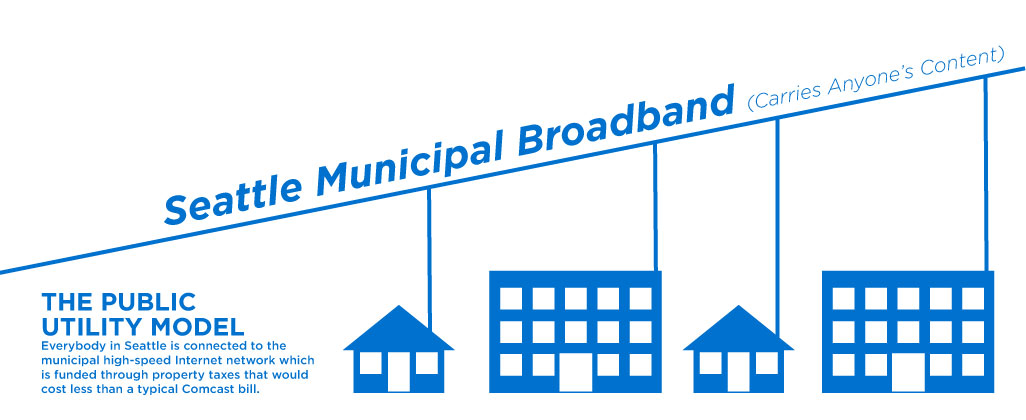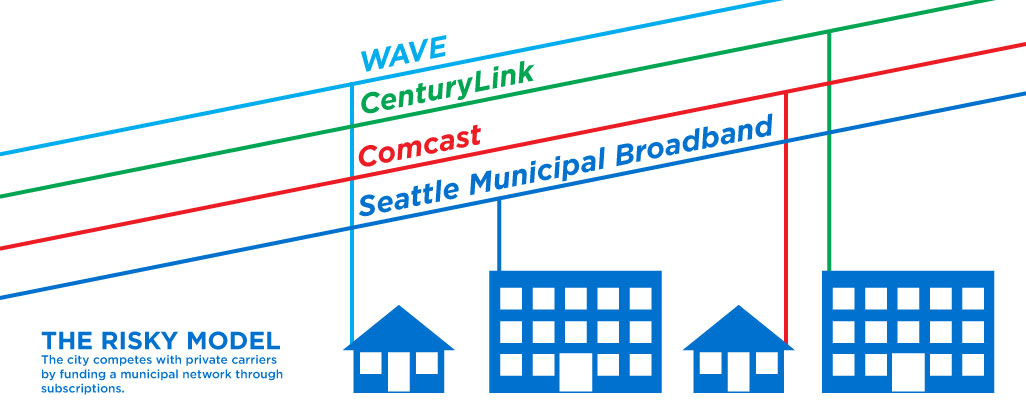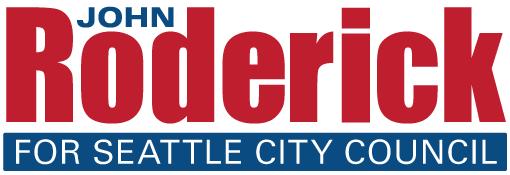
I’ve been on the campaign trail three months, and I’ve been pleasantly surprised that the one issue where every single candidate seems to agree is “municipal broadband.” Supplying high speed internet to everyone is a pretty forward-thinking idea, so I was encouraged by the apparent consensus. “Seattle politicians DO have the will to make big decisions when the benefits are so obvious,” I thought. “There’s hope for us yet.”
So I was dismayed when the mayor gave a press conference recently on the results of his broadband study. He sighed and said that they’d looked at the plan every which way and, darn it, it was just too expensive and wouldn’t pay for itself. Shucks. The sitting city council also shook their heads sadly, as if to say, “Can’t say we didn’t try, but gee whiz, it’s just too gosh darn impossible. Oh well.”
Well, funny thing is, they only studied one method of building municipal broadband, the one that puts the city into competition with existing carriers and isn’t really a municipal utility at all. The system they “studied”, and rejected, was a straw man. There’s another way, a more elegant system, and the one we were ACTUALLY talking about the whole time: a true municipal utility providing broadband to all. Let’s take a look at the differences.
The plan studied by the mayor, and implemented with varying success in other cities, is one where the city builds a fiber optic network that competes with the existing carriers, Comcast, Wave and Centurylink, to acquire customers. The city would just be another player in the market. If a customer chooses the city carrier, we’d run a line to the house and charge a monthly fee for the service, just like the other guys. The test of this method would be whether enough businesses and households would sign up for service to pay for the cost of infrastructure. The mayor’s office ran the numbers and decided: no.

It’s expensive to build a fiber optic infrastructure. That’s why we have so few choices now. The cable and telephone companies are squeezing internet down the copper and cable they strung up for their cable and telephone service years ago. Those wires are choked, and our service suffers, but there’s so little competition the cable and phone companies haven’t felt any pressure to improve their networks. That’s where we are now.
The OTHER flavor of municipal broadband bypasses the private companies completely. In this version, the city runs fiber optic cable right to every business and household—you don’t have to sign up—and we all pay for it with taxes and fees. Broadband internet comes just like power, water and sewer, to everybody.
Now, before you shake your head and say, “John Roderick wants to solve every problem with extra TAXES!” let’s take a quick look at the numbers. Right now I pay about $1200 a year to Comcast for basic service: a bunch of channels I don’t want and some slow, unreliable internet. Building true municipal broadband would require a significant tax source, yes, but a 2011 survey pegged the cost at an average $400 a year in property taxes. That’s a third of the cost, paid in taxes rather than in fees.
Under this system, every household would be connected to the internet immediately. The city, libraries and schools would provide content through our own system. Skype and other “voice over internet” would be available to all. Plus, any provider can use the network. If you want to subscribe to Comcast you still can! I am not making this up - it was all described in a 2011 study and it is called the “community access” model. It is the actual solution to the problem.
Most importantly, think of the economic and social value to the city of connecting everyone to gigabit speeds. The internet isn’t a toy, it’s increasingly where business, education, and entertainment take place. The opportunity cost of NOT connecting the city with broadband is enormous, far exceeding the cost to build. We are already bogged down, and internet use is skyrocketing. We need to solve this problem ourselves.
So what’s the problem with replacing Comcast, Wave and Centurylink with a true public utility? Well, for those companies it is a huge problem. They will fight hard to preserve their sweet hold on profits, guaranteed by their oligopolistic status.
Maybe that’s why Mayor Ed Murray’s report did not study this type of municipal broadband. It really only studied the kind that everybody knows is risky, and doesn’t work so well, and then rejected it and closed the books. It doesn’t sound like they were sincere about municipal broadband at all.
So when a candidate says they support municipal broadband, it’s time to ask them what kind. Do they mean they want to study the feasibility of limping into the private marketplace? Or are they sincere about replacing it entirely with a public utility that connects every home? I’m for the public utility.
– John Roderick
